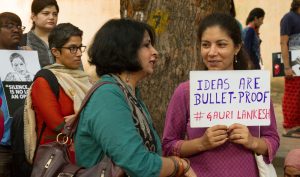By Malcolm Katrak, a guest blogger and judicial clerk to Justice S.N. Variava
The Asian News International (ANI) tweeted on September 5th, “There has been a shootout at Gauri Lankesh’s house this evening; she is no more. Body found in the veranda.” Another tweet swiftly followed, “This is a cowardly act, she is just a writer & journalist, not a terrorist or a naxalite.”

Gauri Lankesh, a senior journalist from Karnataka, had been portrayed as a critic of Hindu right-wing extremism by journalists and news outlets around the country after she was shot dead in Karnataka, India. A total of seven bullets were fired, four missing the target and three hitting Lankesh. The Chief Minister of Karnataka termed the murder as brutal and further stated that this was an “assassination on democracy.”
Freedom of press and protection of free speech has long been debated in the halls of parliament and the corridors of the judiciary in India. Be it the First Amendment in the United States, Article 19 (1) of the Constitution of India, or the International Covenants, there has always been an issue with respect to the limitations of free speech and expression. The horrendous and brutal attack on Gauri Lankesh reminded the country of the horrors of the emergency, where the press was stifled and gagged until they choked.
What is termed as the fourth pillar of democracy now again looks subservient to the other three pillars. Two weeks ago, Madhya Pradesh police arrested nineteen-year-old Abhishek Mishra for attacking the Chief Minister of Madhya Pradesh on social media regarding the recent failure of demonetization carried out by the Narendra Modi government. Further down the timeline, two months ago, there was a gratuitous misuse of legislative privilege in Karnataka, when two journalists were sentenced to jail terms by the Karnataka assembly for publishing defamatory materials.
Justice Louis Brandeis in the U.S. Supreme Court case of Whitney v. California rightly stated that those who won independence believed that the final end of the state was to make men free to develop their faculties, and that in its government the deliberative forces should prevail over the arbitrary. Liberty was valued both as an end and a means; they believed liberty to be the secret of happiness and courage to be the secret of liberty. The current predicament among the public is to be silent until something happens.

A few months ago, the Supreme Court of India in the Subramanian Swamy case held that Section 499 of the Indian Penal Code, which deals with criminal punishment for defamation, is not disproportionate and not ultra vires (beyond the powers) of the provisions of the Constitution. This may have run against the international trend of decriminalizing defamation albeit the court proceeded on the basis of reasonableness. On the other hand, in Shreya Singhal, the Apex court proceeded to strike down Section 66A of the Information Technology Act, 2000 as being violative of Article 19(1) of the Constitution. Article 19(1) enshrines the fundamental right of free speech and expression.
In the past, the Supreme Court of India as a watchdog has been cognizant of such cases where press was gagged and whistleblowers blown. The Supreme Court must realize that free speech and expression is the basis of human rights, the root of human nature and the mother of truth. Protection of free speech cannot be done by imparting judgments but by imparting justice for those who stood to protect it.

On a sympathetic note, the death of Gauri Lankesh has received considerable angst amongst the public with candle light marches and condolence meetings throughout the country. On the other hand, there are those who have taken to social media to post pictures of Gauri Lankesh with students of Jawaharlal Nehru University, especially the ones alleged to have committed sedition, with the tagline, “what goes around comes around.” A few others have tried to connect the dots with Gauri Lankesh’s defamation case and Amit Malviya’s tweet on November 29, 2016, which reads as follows, “Prahlad Joshi, BJP MP from Dharwad, gets Gouri Lankesh convicted in a defamation case… Hope other journos take not.” Blaming any right wing Hindu group for the murder of Lankesh would be an unsubstantiated allegation. Unfortunately, the way circumstances are panning out, these unsubstantiated allegations may be the reason for journalists’ convictions.
Men feared witches and burnt women, politicians fear free speech and shoot writers. Unfortunately, Michelle Obama’s words ring bells of fear and woes: “I have seen how leaders rule by intimidation. Leaders who demonize and dehumanize entire groups of people often do so because they have nothing else to offer and I have seen how places that stifle the voice and dismiss the potential of their citizens are diminished: how they are less vital, less hopeful, less free.”
Malcolm Katrak is a law clerk to Justice (Retd.) S.N. Variava, former judge of the Supreme Court of India. In the past, he has worked with Darius Khambata, former Vice-President of the London Court of International Arbitration and Justice S. J. Kathawalla, judge of Bombay High Court.
